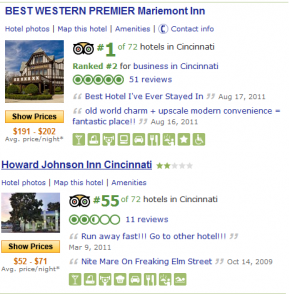My column in BtoB magazine this month. Original here.
The manager of the Mansion on Peachtree hotel in Atlanta has it pretty good these days. The Mansion is the top-rated hotel in the city on TripAdvisor.com, with 163 reviews, nearly all of them five stars. The endorsement has enabled the Mansion to hold its premium prices and cut its acquisition costs. It’s also got the staff hopping to maintain the coveted top position.
“Social media is vital to our business today,” said Micarl Hill, the Mansion’s managing director. “But it also keeps us on our toes. People can tell everybody about a bad stay with the push of a button. What they say isn’t always fair, but we take it seriously.”
Recommendation engines like TripAdvisor, TravelPod, Google Places and Yelp are transforming the hospitality industry, and they’re coming to your town.
Mark Snider, owner of the Winnetu Oceanside Resort in Martha’s Vineyard, Mass., personally contacts every single customer who posts a complaint about his hotel on an online review site. Fortunately, it’s not a big job. Winnetu’s No. 1 rating on TripAdvisor drives so much business that Snider slashed his marketing budget this year.
If you think this trend is confined to consumer markets and small electronics, think again. Consider Spiceworks, a thriving community for IT professionals, where members have posted thousands of reviews of everything from computer servers to computer consultants. “When I’m looking at a vendor, I don’t Google it; I Spiceworks it,” wrote one forum member.
At Glassdoor.com, employees rate the companies they work for, review executive performances and swap salary information. How do you think the recruiting business will be changed by this?
And we’re still in the very early going. It’s only a matter of time before review sites pop up in every category of business, including B2B. Facebook and LinkedIn already make polling easy, and Quora is awash with questions about recommended vendors.
This is going to change the rules of marketing. People stopped listening to pitches some time ago, but they didn’t stop listening to each other. What you say about yourself now matters a lot less than what others say about you.
Marketers need to be tuned into these conversations 24/7, spot detractors and quickly try to turn them around. They also need to provide incentives for people to tell others about their positive experiences.
Start by discarding the “see no evil” mindset. Customers will share their opinions whether you want them to or not. You might as well be open about it. Southwest Airlines and Dell Computer encourage customers to lodge complaints on their company Facebook pages and address nearly every one. That’s called responsiveness, and it’s always been a good business practice. Today’s it’s life or death.


